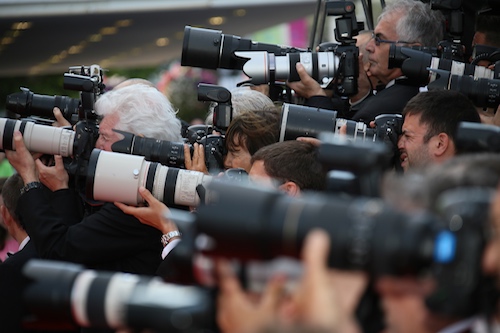 On Thursday, October 4th, U.S. District Judge Alvin K. Hellerstein of the Southern District of New York entered an order and opinion granting summary judgment to defendant Getty Images in a copyright infringement case brought by a collection of plaintiffs led by photographer press agency Zuma Press. Judge Hellerstein’s grant of summary judgment dismissed the case without prejudice after the undisputed evidence showed that Zuma caused Getty to confuse Zuma’s images with images that Getty had been authorized to use.
On Thursday, October 4th, U.S. District Judge Alvin K. Hellerstein of the Southern District of New York entered an order and opinion granting summary judgment to defendant Getty Images in a copyright infringement case brought by a collection of plaintiffs led by photographer press agency Zuma Press. Judge Hellerstein’s grant of summary judgment dismissed the case without prejudice after the undisputed evidence showed that Zuma caused Getty to confuse Zuma’s images with images that Getty had been authorized to use.
This case stems back to a complaint filed by Zuma Press in August 2016, a few months after Getty displayed and offered thousands of images for commercial use that were credited to Les Walker. However, the 47,048 images making up that collection were either once owned or licensed by Zuma. Zuma requested that Getty take down the images in May and Getty complied after having earned less than $100 in total revenues for those pictures. In its lawsuit, Zuma and the other plaintiffs alleged that had committed copyright infringement and violated the integrity of copyright management information under Section 1202 of the Digital Millennium Copyright Act (DMCA) for intentionally altering the copyright attribution information embedded in those images.
“Zuma has nobody to blame but itself for how Getty came to possess these images, though,” Judge Hellerstein’s opinion reads, adding that the path for the images from Zuma to Getty was “circuitous but identifiable.” That path began in 2010 when Zuma entered into a representation agreement with Corbis, an image licensing firm, allowing Corbis to distribute Zuma’s images in exchange for remitting a 40 percent royalty rate that had been negotiated between the firms. However, Corbis signed a different agreement with NewSport, another image company, which involved a 50 percent royalty rate.
In order to take advantage of NewSport’s higher royalty rate, Zuma hired Les Walker, NewSport’s president, as an independent contractor in September 2011. Zuma then began submitting images to NewSport so that those images could be submitted to Corbis through NewSport’s file transfer protocol (FTP) at the higher royalty rate to be paid by Corbis under the terms of a redirection agreement entered into by all three parties in early November 2011. “ By this scheme and Redirection Agreement, Zuma thus mixed its images into a collection otherwise associated with Walker and NewSport,” Judge Hellerstein’s opinion reads.
In April 2012, Zuma ended its use of NewSport’s FTP for submitting images to Corbis. Beginning in January 2013, after Walker resigned from his position at Zuma, Zuma asked Walker to contact Corbis about switching the images submitted through NewSport’s FTP back to Zuma’s account. In email correspondence through June of that year, however, Walker indicated that no such agreement to transfer the photos back to Zuma had ever been in place and he didn’t consent for the images to be transferred back to Zuma. At this time, the images in question had conflicting credit information that pointed to both NewSport and Zuma as the source of the photos.
In early 2016, Getty Images obtained the right to distribute the portfolio of images at the center of this suit from Unity Glory International, which had purchased the images from Corbis in January 2016. In April of that year, Getty entered into a licensing agreement with Walker after which Getty proceeded to migrate the NewSport collection into the Getty database. The migration process was largely automated by computer code and relied on metadata attached to the photos which indicated that NewSport, not Zuma, was the licensing agency.
Judge Hellerstein found that Zuma was barred from suing Getty for the unauthorized display of images under the equitable estoppel defense. Zuma knowingly comingled its photographs with NewSport’s and while Zuma tried to retrieve these images, it didn’t receive written consent for such from NewSport. Zuma’s DMCA claim was also barred by estoppel as that claim required the intentional removal or altering of copyright information and there was no evidence to show that Getty knew that the NewSport collection included Zuma images nor that it intended to induce or facilitate infringement.
Image Source: Deposit Photos.

![[IPWatchdog Logo]](https://ipwatchdog.com/wp-content/themes/IPWatchdog%20-%202023/assets/images/temp/logo-small@2x.png)

![[Advertisement]](https://ipwatchdog.com/wp-content/uploads/2024/04/Patent-Litigation-Masters-2024-sidebar-early-bird-ends-Apr-21-last-chance-700x500-1.jpg)

![[Advertisement]](https://ipwatchdog.com/wp-content/uploads/2021/12/WEBINAR-336-x-280-px.png)
![[Advertisement]](https://ipwatchdog.com/wp-content/uploads/2021/12/2021-Patent-Practice-on-Demand-recorded-Feb-2021-336-x-280.jpg)
![[Advertisement]](https://ipwatchdog.com/wp-content/uploads/2021/12/Ad-4-The-Invent-Patent-System™.png)







Join the Discussion
One comment so far.
Eric Berend
October 21, 2018 09:07 amHmmm, was there a different ‘team’ of attorneys guiding the initiative towards a higher royalty rate, in 2011? Corbis is a long time player in this space, from well before the advent of the Internet. Seems the extra 10 percent quite stung Zuma’s management, when discovered. And, no reversion or buyback provision? Where was the internal continuity at Zuma?